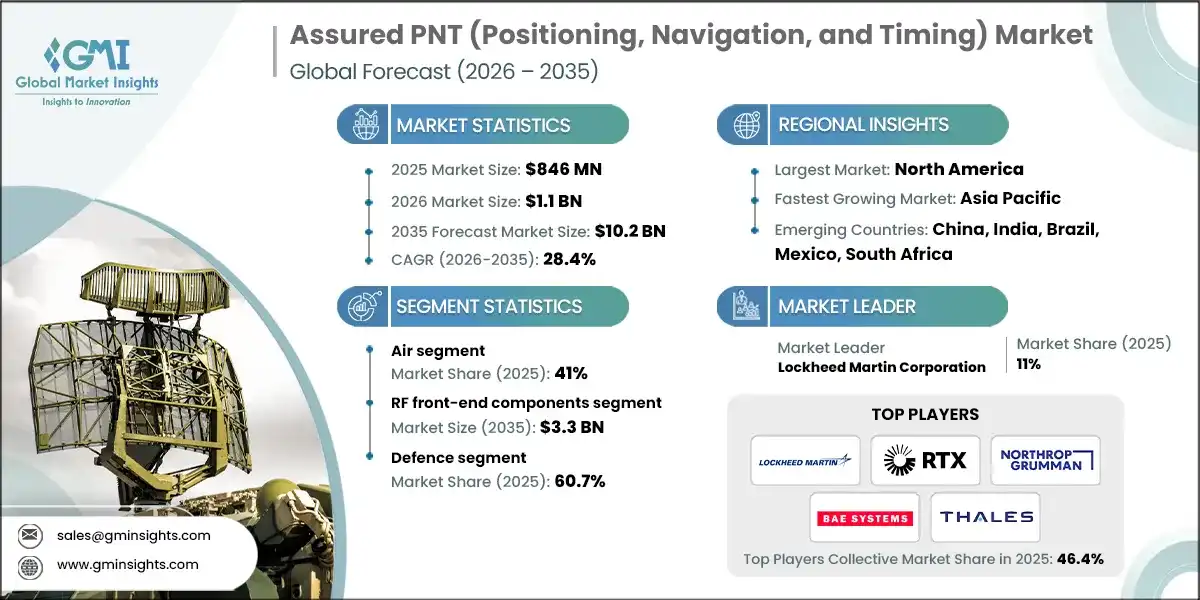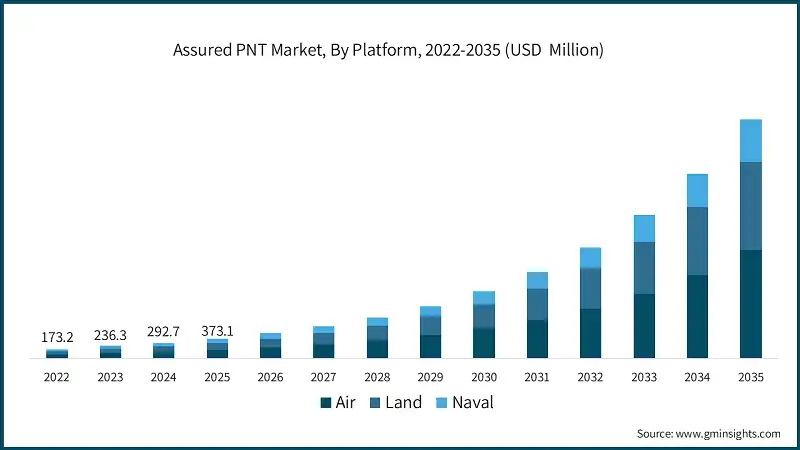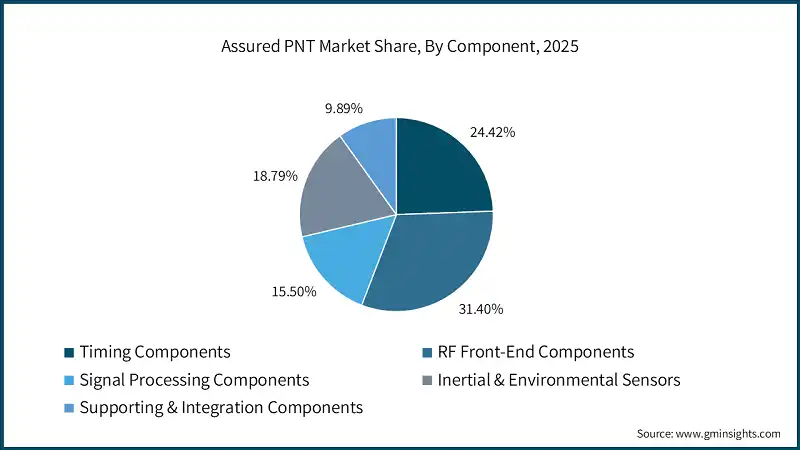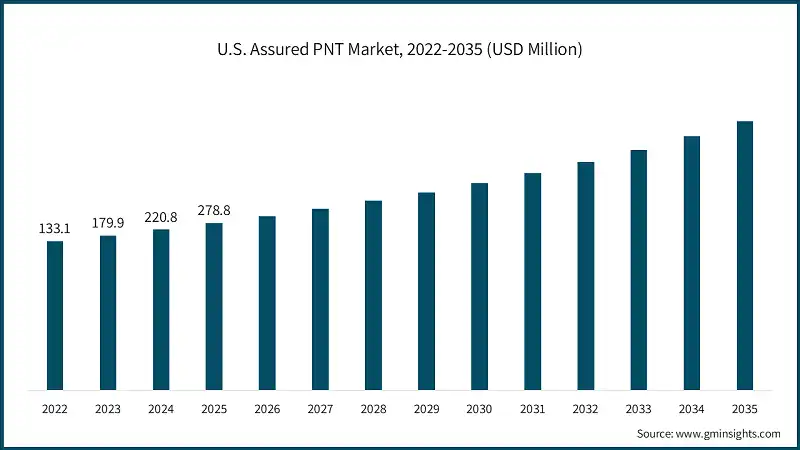Summary
Table of Content

Assured PNT (Positioning, Navigation, and Timing) Market
Get a free sample of this report
Form submitted successfully!
Error submitting form. Please try again.
Thank you!
Your inquiry has been received. Our team will reach out to you with the required details via email. To ensure that you don't miss their response, kindly remember to check your spam folder as well!

Request Sectional Data
Thank you!
Your inquiry has been received. Our team will reach out to you with the required details via email. To ensure that you don't miss their response, kindly remember to check your spam folder as well!
Form submitted successfully!
Error submitting form. Please try again.
Assured PNT Market Size
The global assured PNT market was estimated at USD 846 million in 2025. The market is expected to grow from USD 1.1 billion in 2026 to USD 3.7 billion in 2031 and USD 10.2 billion by 2035, at a CAGR of 28.4% during the forecast period of 2026–2035, according to the latest report published by Global Market Insights Inc.

To get key market trends
The increased dependence on critical infrastructures demands the development of resilient timing solutions. Core industries such as telecommunications, energy, defense, and finances need accuracy and reliability for their operations. The growing concerns on the use of the Global Positioning System (GPS) for time synchronization and navigation are due to the vulnerabilities of jamming, spoofing and signal loss. To resolve these issues, the development of Assured PNT systems which provide resilience and redundancy has become fundamental. These systems utilize a combination of contradicting methods and multi-source assurance technologies to guarantee the system remains operational if one of the timing or positioning sources is compromised.
For instance, In May 2024, Viavi Solutions Inc. (VIAVI) launched the SecurePNT 6200 with SecureTime services, a robust timing clock solution. This system provides comprehensive assurance for positioning, navigation, and timing services, which are crucial for global infrastructure operations. Building on VIAVI's existing PNT solutions, SecurePNT and SecureTime incorporate the Fugro AtomiChron timing service. This integration enables intelligent, zero-trust, multisource assurance by using signals from various satellite orbits, including GPS and Global Navigation Satellite System (GNSS) constellations.
The assured PNT market is evolving to offer more robust, secure, and integrated solutions. This change addresses the growing reliance on GPS and GNSS technologies in critical infrastructure, defense, telecommunications, and new applications like self-driving cars and smart cities. To combat weaknesses such as spoofing and jamming, the industry is moving towards multi-source assurance. This methodology combines GEO, MEO and LEO GNSS constellations, ground augmentation, and zero-trust security models.
The market covers the range of technology, systems, and capabilities that provide resilient, secure, and accurate positioning, navigation, and timing (PNT) services in contested, denied, or degraded environments for critical civilian and defense purposes.
Assured PNT (Positioning, Navigation, and Timing) Market Report Attributes
| Key Takeaway | Details |
|---|---|
| Market Size & Growth | |
| Base Year | 2025 |
| Market Size in 2025 | USD 846 Million |
| Market Size in 2026 | USD 1.1 Billion |
| Forecast Period 2026 - 2035 CAGR | 28.4% |
| Market Size in 2035 | USD 10.2 Billion |
| Key Market Trends | |
| Drivers | Impact |
| Increase in demand for reliable information in applications such as emergency services, military, and aerospace | Drives deployment of assured PNT solutions to ensure uninterrupted, accurate, and mission-critical positioning and timing |
| Expansion of defense and security applications requiring reliable navigation | Boosts investments in resilient navigation systems to maintain operational effectiveness in contested or GPS-denied environments |
| Growing vulnerabilities of GPS highlighting the need for assured PNT Systems | Accelerates development and adoption of alternative and redundant PNT technologies to mitigate risks from jamming, spoofing, and signal loss |
| Rising adoption of multi-source and hybrid PNT technologies | Enhances system reliability, accuracy, and resilience by integrating GNSS, inertial, and alternative navigation sources across sectors |
| Pitfalls & Challenges | Impact |
| High development and training cost | Limits rapid adoption and deployment of assured PNT solutions across commercial and defense sectors |
| Lack of proper regulations and standard | Creates market fragmentation and slows integration of interoperable and compliant PNT systems |
| Opportunities: | Impact |
| Integration of assured PNT with autonomous vehicles and drones for enhanced navigation | Expands market opportunities by enabling precise, reliable navigation in complex and dynamic operational environments |
| Growth in maritime and aviation sectors requiring resilient navigation solutions | Growth in maritime and aviation sectors requiring resilient navigation solutions – Drives demand for robust PNT systems to ensure safety, operational continuity, and regulatory compliance in critical transport sectors |
| Market Leaders (2025) | |
| Market Leaders |
11% market share |
| Top Players |
|
| Competitive Edge |
|
| Regional Insights | |
| Largest Market | North America |
| Fastest growing market | Asia Pacific |
| Emerging countries | China, India, Brazil, Mexico, South Africa |
| Future outlook |
|
What are the growth opportunities in this market?
Assured PNT Market Trends
- The market is continuing to grow due to the increasing demand for resilient navigation and timing systems in the defense, aerospace, and critical infrastructure sectors. Integration of the GNSS three-constellation system, terrestrial augmentation, and anti-jamming technologies are increasing operational reliability, especially in GPS-denied environments.
- The continued advancements in sensor fusion, particularly in inertial and environmental systems, and in RF front-end components, are allowing the systems to achieve precise positioning in highly complex scenarios. The component miniaturization and increased power efficiency are enabling the systems to be deployed over land, air, and naval platforms, and it broadens the applications in the military and commercial sectors.
- Region-wise adoption trends reflect robust growth in North America and Europe because of government efforts and strategic investments in resilient navigation methods and technology. The Asia Pacific is characterized by strong growth especially in China and India, that are leading the development of autonomous transport, defense systems modernization, and smart infrastructure.
- The market for PNT systems is also rapidly expanding due to its commercial applications in fields such as telecommunications, autonomous vehicles, and precision agriculture. The increasing collaboration between the public and private sectors, along with regulatory support for standardization, is driving rapid innovation and adoption of complex and integrated PNT systems.
Assured PNT Market Analysis

Learn more about the key segments shaping this market
On the basis of platform, the market is segmented into air, land and naval.
- The air segment held a market share of 41% in 2025. Assured positioning, navigation, and timing (PNT) aviation solutions are becoming of utmost importance to secure flight safety, achieve fully autonomous flight operations, and manage air traffic efficiently (ATM). The use of state-of-the-art avionics, sensor fusion technology, and advanced navigation systems enables accurate and reliable positioning, navigation, and timing, even in scenarios involving GPS outages or in highly congested airspace.
- Land segment market is projected to reach USD 3.7 billion by 2035. On land, assured PNT adoption is expanding for autonomous vehicles, logistics, and railway systems. Advanced sensors and resilient positioning solutions enable precise navigation, fleet management, and route optimization, especially in urban areas, tunnels, and remote regions where GPS reliability is compromised.

Learn more about the key segments shaping this market
On the basis of component, the assured PNT market is segmented into timing components, RF front-end components, signal processing components, inertial & environmental sensors, and supporting & integration components.
- The RF front-end components market is anticipated to reach USD 3.3 billion by 2035. The RF front-end component market is growing due to improved signal accuracy with new advanced receivers and signal transmitters. New front-end components are needed because of the increasing demand for accurate signal reception and transmission in aerospace, defense, and important infrastructure.
- The inertial & environmental sensors market is projected to grow at a CAGR of over 29.4% by 2035. Adoption of inertial and environmental sensors is growing in order to achieve precise position and navigation where GPS signals are weak or unavailable. Advancements in MEMS and sensor fusion technology are driving adoption across aviation, defense, automotive, and industrial sectors.
On the basis of end use, the assured PNT market is divided into defence and homeland security.
- Defence dominated the global market accounting for 60.7% market share in 2025. Defence applications increasingly rely on assured PNT for mission-critical operations, navigation accuracy, and situational awareness in GPS-denied or jammed environments. Military adoption spans ground, air, and maritime platforms, with emphasis on electronic warfare resilience, tactical coordination, and secure positioning solutions.
- The homeland security market is projected to grow at a CAGR of 27.5% by 2035. Homeland security agencies are adopting assured PNT to ensure uninterrupted navigation and timing during emergencies, border surveillance, and critical infrastructure protection. Integration with monitoring systems and resilient technologies enables accurate positioning and coordinated response even in GPS-compromised or hostile environments.
The North America assured PNT market held a 35% share of the global market in 2025.
- North America continues to be the largest market owing to the expanding defense modernization programs and regulatory focus on resilient navigation and timing on the critical infrastructure.
- Adoption of multi-sensor fusion, anti-jam technologies, and GNSS alternatives are driven by investments of the U.S. Department of Defense and homeland security agencies. There is also strong commercial demand in telecommunications, autonomous systems, and precision agriculture, which contributes to the growth of the region which has a strong technology ecosystem and reinforced public-private collaboration.

Looking for region specific data?
The U.S. assured PNT market was valued at USD 133.1 million and USD 179.9 million in 2022 and 2023, respectively. The market size reached USD 278.8 million in 2025, growing from USD 220.8 million in 2024.
- The U.S. market for assured Positioning, Navigation, and Timing (PNT) services is supported by the advancement of the U.S. military and the need for resilient navigation and timing for essential military and infrastructure applications. In December 2025, U.S. Army issued new Request for Information (RFI) for the Mounted Assured Positioning, Navigation, and Timing System (MAPS) Gen II, demonstrating a growing interest in multi-tiered solutions that operate seamlessly, in military-grade environments with contested or absent GPS.
Europe assured PNT market accounted for USD 216.7 million in 2025 and is anticipated to show lucrative growth over the forecast period.
- Collaborative efforts focusing on Global Navigation Satellite System (GNSS) resilience and strategic autonomy underpin Europe’s assured Positioning Navigation and Timing (PNT) market growth. Within the European Space Agency and its member states, there is a high focus on the integration of multi-constellation signals and the incorporation of land-based augmentation systems to mitigate the reliance on a singular navigation source. New regulatory policies and public-private partnership arrangements are fast tracking the implementation of systems for the defense, transport and critical infrastructure.
Germany assured PNT market dominates the Europe market, showcasing strong growth potential.
- Germany continues to develop resilient Positioning, Navigation, and Timing (PNT) capabilities through government and research agency partnerships emphasizing innovative and diversified approaches to improving signal integrity and autonomy. During the Munich Satellite Navigation Summit, representatives from the German Space Agency underscored the achievements made in the strengthening of PNT resilience and the integration of innovations from the space sector.
The Asia Pacific assured PNT market is anticipated to grow at the highest CAGR of 30% during the analysis timeframe.
- Asia Pacific is the fastest-growing assured PNT region, propelled by rapid urbanization, defense modernization, and smart infrastructure initiatives. China leads with substantial investments in indigenous satellite navigation and complementary terrestrial systems, while other regional economies scale adoption in autonomous transport and telecommunications.
China assured PNT market is estimated to grow with a significant CAGR, in the Asia Pacific market.
- China’s guaranteed PNT expansion is supported by BeiDou improvements and state initiatives focused on the seamless mobility across defense, transport, and national infrastructure. The state’s encouragement on land alternatives and the multi-sensor systems increase market penetration and self-sufficient PNT technology.
Brazil leads the Latin American market, exhibiting remarkable growth during the analysis period.
- Investment in GNSS augmentation for precision farming, transport, and infrastructure adaptability have all contributed to the expansion of the Brazilian market. Development of domestic navigation technology by the space agency will promote wider use of PNT technologies in various economic activities.
South Africa assured PNT market experience substantial growth in the Middle East and Africa market in 2025.
- The anticipated adoption of PNT in South Africa is being driven by the defense and mining sectors. The growing adoption of autonomous operations in remote environments is increasing the need for GPS-denied systems and higher reliability on navigation.
Assured PNT Market Share
The market is highly competitive. The top 5 players in the market are Lockheed Martin Corporation, RTX Corporation (Collins), Northrop Grumman, BAE Systems, and Thales Group, accounting for a significant share of over 46.4% in the market.
In the assured PNT Market, the competitors like Lockheed Martin, Northrop Grumman, and BAE Systems, are integrating multi-sensor systems, GPS-denied solutions, and resilient timing technologies to gain and sustain a competitive edge. For example, Lockheed Martin, Northrop Grumman, and BAE Systems are integrating advanced inertial navigation, RF front-end, and signal processing technologies to bolster the reliability of their systems. There is considerable emphasis on evolving the solution set, improving market access and customer engagement via M&A, strategic partnerships, and R&D.
The development of government contracts, defense modernization efforts, and adoption within primary infrastructure sectors also facilitate the expansion of the market. Stakeholders focus on tailoring integration solutions for air, land, and sea, and on optimizing market accessibility from regional partnerships.
Companies are innovating, employing next-generation PNT technologies, and crafting strategic plans that prioritize adaptive resilience, regulatory compliance, and widespread adoption in the defense and commercial domains in response to growing demand.
Assured PNT Market Companies
Prominent players operating in the market are as mentioned below:
- Advanced Navigation
- Aevex Aerospace
- BAE Systems plc
- Bliley Technologies
- Curtiss-Wright
- General Dynamics
- Hemisphere GNSS
- Hexagon AB
- Honeywell International
- Israel Aerospace Industries
- KVH Industries
- Leidos
- Leonardo
- Lockheed Martin
- Northrop Grumman
- Lockheed Martin Corporation
Lockheed Martin holds a significant market share of around 11% in the assured PNT market. Lockheed Martin intends to provide next generation of defense-grade PNT solutions, which combine multi-sensor and GPS-denied technologies. Its primary competing advantages include extensive military program experience and large-scale integration capabilities across air, land and sea assets, and worldwide systems.
Northrop Grumman commands a market share of approximately 12.6% in the market. Northrop Grumman leads in inertial navigation, sensor fusion, and GPS-denied operational capabilities. The company uses sophisticated PNT technologies in the defense and space sectors, focusing on dependability, accuracy, and versatility in challenging environments and multi-domain platforms.
RTX Corporation (Collins) is a leading player in the market with a market share of approximately 10.3%. RTX Corporation (Collins) focuses on the research and development of high-reliability avionics and RF front-end components that facilitate dependable navigation and timing systems. RTX Corp. is recognized in the aerospace industry for its highly specialized products, processing and signal innovation, and the integration of multi-constellation GNSS technologies for commercial and military applications.
Assured PNT Industry News
- In April 2023, the U.S. Army awarded a potential USD 402 million contract to TRX Systems to develop second-generation devices designed to provide assured positioning, navigation, and timing (PNT) capabilities for dismounted users. The contract, granted under the third phase of the Small Business Innovation Research (SBIR) program, includes a USD 14.6 million delivery order for over 700 Dismounted Assured PNT Systems Generation II units along with related services.
- In January 2023, L3Harris delivered the Navigation Technology Satellite-3 (NTS-3) to the U.S. Air Force for final testing before its planned late 2023 launch. This Air Force Research Laboratory-funded experiment aims to broadcast positioning, navigation, and timing signals from geostationary Earth orbit, demonstrating next-generation technologies and offering an alternative to GPS for the U.S. military.
The assured PNT market research report includes in-depth coverage of the industry with estimates and forecast in terms of revenue in (USD Million) from 2022 – 2035 for the following segments:
Market, By Components
- Timing components
- Atomic clocks
- Frequency standards / oscillators
- Rf front-end components
- Antennas
- Power amplifiers
- Transponders
- Signal Processing Components
- Receivers (GNSS, multi-constellation, authenticated)
- Anti-jam / anti-spoof modules
- Inertial & environmental sensors
- Accelerometers
- Gyroscopes
- Magnetometers
- Supporting & integration components
- Control electronics
- Software-defined PNT modules
- Interfaces & enclosures
Market, By Platform
- Air
- Military aircraft
- Fighter aircraft
- Special mission aircraft
- Military helicopters
- Unmanned systems
- Military aircraft
- Land
- Combat vehicles
- Main battle tanks
- Armored personnel carriers
- Armored amphibious vehicles
- Others
- Unmanned ground vehicles
- Combat vehicles
- Naval
- Destroyers
- Frigates
- Corvettes
- Submarines
Market, By End Use
- Defense
- Homeland security
The above information is provided for the following regions and countries:
- North America
- U.S.
- Canada
- Europe
- Germany
- UK
- France
- Spain
- Italy
- Netherlands
- Asia Pacific
- China
- India
- Japan
- Australia
- South Korea
- Latin America
- Brazil
- Mexico
- Argentina
- Middle East and Africa
- South Africa
- Saudi Arabia
- UAE
Frequently Asked Question(FAQ) :
Who are the key players in the Assured PNT industry?
Key players in the market include Lockheed Martin Corporation, RTX Corporation (Collins), Northrop Grumman, BAE Systems, Thales Group, Honeywell International, Leonardo, and General Dynamics.
What are the upcoming trends in the Assured PNT industry?
Key Assured PNT market trends include adoption of multi-sensor fusion technologies, increased deployment of anti-jamming and anti-spoofing solutions, and integration of alternative GNSS and terrestrial augmentation systems.
Which region leads the Assured PNT market, and what is the U.S. market size?
The U.S. Assured PNT industry reached USD 278.8 million in 2025, making it the largest contributor within North America. Growth is driven by defense modernization initiatives, military-grade PNT programs, and increasing demand for resilient navigation across critical infrastructure.
Which end-use segment dominates the Assured PNT market?
Defense dominated the Assured PNT industry with a 60.7% market share in 2025, as military operations increasingly rely on resilient positioning and timing systems for mission-critical applications.
What is the growth outlook for inertial & environmental sensors in the Assured PNT industry?
The inertial & environmental sensors segment is projected to grow at a CAGR of over 29.4% by 2035, supported by advancements in MEMS technology and increasing demand for precise navigation in GPS-denied conditions.
What is the projected valuation of the land platform segment by 2035?
The land segment of the Assured PNT market is projected to reach USD 3.7 billion by 2035, driven by growing use in autonomous vehicles, logistics, and railway navigation systems operating in GPS-challenged environments.
How much revenue did the air platform segment generate in 2025?
The air platform segment accounted for 41% market share in 2025, reflecting strong adoption of assured PNT systems across military aviation, unmanned aerial systems, and advanced avionics applications.
What is the market size of the Assured PNT (Positioning, Navigation, and Timing) market in 2025?
The Assured PNT market size was valued at USD 846 million in 2025, driven by rising demand for resilient navigation and timing solutions across defense, aerospace, and critical infrastructure applications.
What is the current Assured PNT market size in 2026?
The Assured PNT industry is projected to reach USD 1.1 billion in 2026, supported by increasing investments in multi-source and GPS-denied positioning technologies.
What is the projected value of the Assured PNT market by 2035?
The global market is expected to reach USD 10.2 billion by 2035, growing at a CAGR of 28.4% from 2026 to 2035 due to expanding defense modernization programs and critical infrastructure protection needs.
Assured PNT (Positioning, Navigation, and Timing) Market Scope
Related Reports


